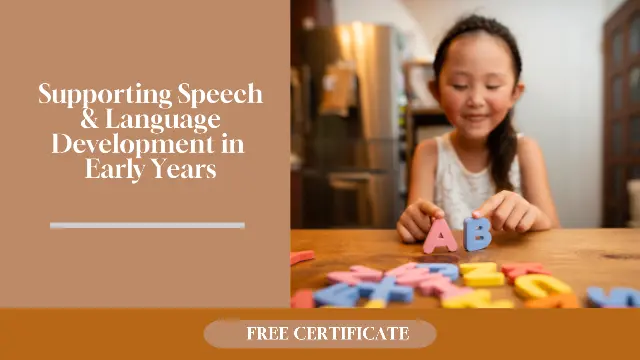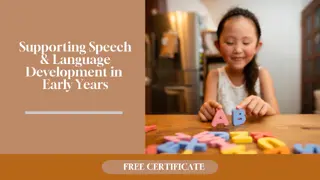
Supporting Speech & Language Development in Early Years
Interactive Video Lessons | Free E-Certificate | Tutor Support
METAVERSESKILLS
Summary
- Certification of Completion - Free
- Tutor is available to students
Add to basket or enquire
Overview
The "Supporting Speech & Language Development in Early Years" online course is designed to provide participants with a comprehensive understanding of speech and language development in young children and strategies for supporting their communication skills. This course aims to equip individuals with the knowledge and techniques necessary to create a language-rich environment, identify potential speech and language difficulties, and implement effective interventions. Participants will learn about typical speech and language milestones, communication disorders, language stimulation activities, and collaborative approaches with parents and caregivers.
Description
Module 1: Introduction to Speech & Language Development
- Understanding the importance of speech and language development in early years
- Overview of typical speech and language milestones
- Factors that can impact speech and language development
Module 2: Language Stimulation and Enrichment
- Creating a language-rich environment to support language development
- Language stimulation activities and strategies for enhancing vocabulary and communication skills
- Incorporating books, songs, and play into language development activities
Module 3: Identifying Speech and Language Difficulties
- Recognizing signs of speech and language difficulties in young children
- Understanding common speech and language disorders (e.g., articulation disorders, language delays)
- When to refer children for further evaluation and intervention
Module 4: Intervention Techniques and Strategies
- Implementing evidence-based intervention techniques for speech and language difficulties
- Speech sound production activities and strategies for articulation disorders
- Language intervention approaches for language delays and disorders
Module 5: Collaborating with Parents and Caregivers
- Developing effective communication with parents and caregivers
- Providing guidance and support to parents for promoting speech and language development at home
- Collaborative approaches to intervention and progress monitoring
Module 6: Cultural and Multilingual Considerations
- Understanding the influence of culture and multilingualism on speech and language development
- Supporting language development in children from diverse cultural and linguistic backgrounds
- Strategies for working with multilingual children and their families
Module 7: Monitoring Progress and Referral Processes
- Assessing and monitoring children's progress in speech and language development
- Documentation and record-keeping for intervention plans and outcomes
- Collaboration with professionals for further evaluation and support
Who is this course for?
Upon completing the "Supporting Speech & Language Development in Early Years" online course, participants will be well-prepared to pursue a variety of career paths in the field of early childhood education and speech-language support. Graduates of the course can explore the following career options:
- Early Childhood Educator: Work in early childhood education settings, such as preschools or childcare centers, supporting speech and language development in young children and implementing language enrichment activities.
- Speech-Language Pathology Assistant: Assist speech-language pathologists in assessing and treating speech and language difficulties in young children, implementing intervention plans, and monitoring progress.
- Early Intervention Specialist: Provide early intervention services to children with speech and language delays or disorders, working closely with families and collaborating with other professionals.
- Preschool or Kindergarten Teacher: Incorporate speech and language development strategies into classroom activities, supporting children's communication skills and promoting language-rich environments.
- Parent Educator: Offer guidance and support to parents and caregivers in promoting speech and language development at home, providing workshops or one-on-one sessions.
- Language Development Coordinator: Coordinate language development programs or initiatives in early childhood education settings, overseeing curriculum development, staff training, and monitoring progress.
Requirements
No prior knowledge or experience required
Career path
Educational Consultant:
- Provide consultancy services to early childhood education programs or organizations, offering expertise in speech and language development strategies, program evaluation, and curriculum enhancement.
Questions and answers
Currently there are no Q&As for this course. Be the first to ask a question.
Certificates
Certification of Completion
Digital certificate - Included
Reviews
Currently there are no reviews for this course. Be the first to leave a review.
Legal information
This course is advertised on reed.co.uk by the Course Provider, whose terms and conditions apply. Purchases are made directly from the Course Provider, and as such, content and materials are supplied by the Course Provider directly. Reed is acting as agent and not reseller in relation to this course. Reed's only responsibility is to facilitate your payment for the course. It is your responsibility to review and agree to the Course Provider's terms and conditions and satisfy yourself as to the suitability of the course you intend to purchase. Reed will not have any responsibility for the content of the course and/or associated materials.


